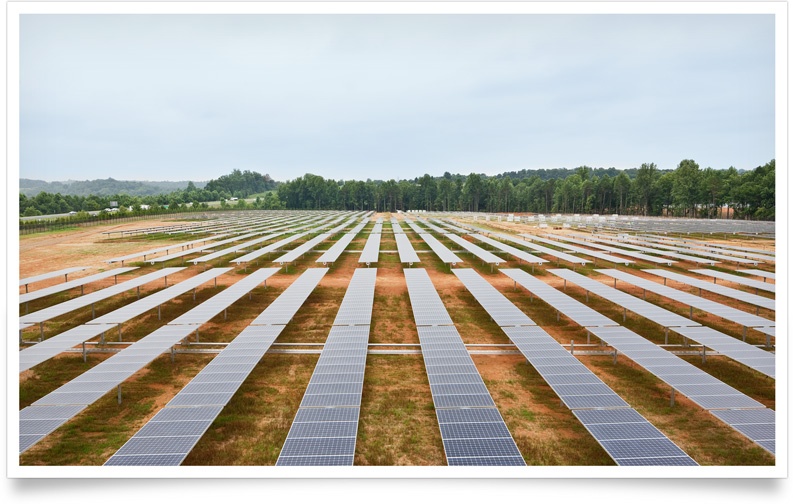
Solar cells power Apple's data center in Catawba County, North Carolina.
This week, we saw updates in energy storage and behavioral energy efficiency, while some of the biggest names in business weighed in on North Carolina’s Renewable Energy and Energy Efficiency Portfolio Standard (REPS). Memo from Apple, Google, and Facebook to Tar Heel State lawmakers: leave REPS alone.
Now pending before North Carolina’s state legislature is H332, which would freeze North Carolina’s renewables and efficiency standard at its current 6 percent of electricity sales. Under current law, the state is set to increase the amount of energy generated from renewable sources and saved by efficiency to 12.5 percent by 2021. Apple, Google, and Facebook sent a letter on Thursday urging the state legislature not to freeze the REPS. These three titans of Internet industry each have significant infrastructure in North Carolina, with a combined $2.7 billion invested in data centers and 200 jobs.
“Alterations risk undermining the state’s almost decade-long commitment to renewable power and energy efficiency,” the companies wrote in a letter submitted by industry group TechNet on their behalf. “We support a comprehensive review, in which we would like to participate. In the meantime, to avoid creating new risk and uncertainty for our businesses, we urge you to keep in place the existing, well-balanced and meticulously examined energy policy.”
AEE’s North Carolina partner, the North Carolina Sustainable Energy Association (NCSEA), has been leading the charge against the bill, and last week AEE and its member companies weighed in as well. In a set of statements released to the media, AEE CEO Graham Richard called the bill “job killing,” and Melanie Santiago-Mosier, director of government affairs for AEE member SunEdison, said H332 threatens as many as 23,000 jobs and $4.8 billion in annual revenue in the state, both of which have grown thanks to the REPS. “Changing the rules of the road like this is anti-business and anti-consumer,” Santiago-Mosier said. AEE members SolarCity and NC-based Southern Energy Management also had statements denouncing the bill. Let’s hope North Carolina legislators are listening.
In happier news, an AEE member company says it is growing by leaps and bounds. Opower, the behavioral energy efficiency company, announced that its platform will reach 1.5 million homes this summer, bringing behavioral energy efficiency, as Utility Dive points out, “into the mainstream.” Opower works with utilities to provide consumers data on how they can reduce their energy usage. During the energy challenges of the 1970s, Americans were asked to turn off lights and put on a sweater. Today, behavioral change is less about preaching, and more about social science. Opower’s method lets consumers get in touch with their energy usage and find ways to save – and feel good about it, rather than deprived.
In energy storage, things are moving quickly as well. When California’s Public Utility Commission passed an energy storage mandate in October 2013, we knew change was afoot. This week, we saw just how much. Pacific Gas & Electric (PG&E), one of California’s leading utilities, just closed on 74 MW worth of storage projects, and, according to Greentech Media, had 5,000 MW worth of bids. We won’t know the winning bids until the company makes a filing with the projects in December.
Between this and news that Duke Energy installed 4MW of battery storage at a retired coal power plant in Ohio, it seems the energy storage industry is sparking. According to Greentech Media, the U.S. deployed 5.8 MW of energy storage in Q1, and is “on pace for a record breaking year.”
Speaking of retiring coal power plants, it turns out that Kentucky might “accidentally” comply with the Clean Power Plan due simply to scheduled coal retirements and cheap natural gas. (That wasn’t so hard, was it?) In other news, one Alaskan island is beating Hawaii in the race for 100 percent renewable energy: Kodiak Island is at 99.7 percent renewable energy, with wind energy, battery storage, and a hydro kicker providing relief from costly diesel imports. ACEEE’s City Energy Efficiency Scorecard was released this week, with Boston taking the top spot. Finally Georgia, which long had policies in place to make solar an unprofitable option, is seeing its top utility plan to install rooftop solar systems under new state rules. Advanced energy marches on!
Learn more about the state of the advanced energy market in 2015 with Advanced Energy Now 2015 Market Report.
